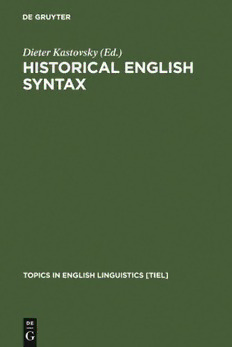
Historical English Syntax PDF
Preview Historical English Syntax
Historical English Syntax Topics in English Linguistics 2 Editors Jan Svartvik Herman Wekker Mouton de Gruyter Berlin · New York Historical English Syntax Edited by Dieter Kastovsky Mouton de Gruyter Berlin · New York 1991 Mouton de Gruyter (formerly Mouton, The Hague) is a Division of Walter de Gruyter & Co., Berlin. ® Printed on acid-free paper which falls within the guidelines of the ANSI to ensure permanence and durability. Library of Congress Cataloging in Publication Data Historical English syntax / edited by Dieter Kastovsky. p. cm. — (Topics in English linguistics : 2) Proceedings of the Kellner-Festival, held in 1988 at Schloss Liechtenstein. Includes bibliographical references and index. ISBN 0-89925-683-X (U.S. : acid-free paper) 1. English language —Syntax —Congresses. 2. English lan- guage—Grammar, Historical —Congresses. I. Kastovsky, Dieter. 1940- . II. Kellner-Festival (1988 : Schloss Liechten- stein). III. Series. PE1361.H57 1991 425—dc20 90-27043 CIP Deutsche Bibliothek Cataloging in Publication Data Historical English syntax / ed. by Dieter Kastovsky. — Berlin ; New York : Mouton de Gruyter, 1991 (Topics in English linguistics ; 2) ISBN 3-11-012431-9 NE: Kastovsky, Dieter [Hrsg.]; GT © Copyright 1991 by Walter de Gruyter & Co., D-1000 Berlin 30. All rights reserved, including those of translation into foreign languages. No part of this book may be reproduced or transmitted in any form or by any means, electronic or mechanical, including photocopy, recording, or any information storage and retrieval system, without permission in writing from the publisher. Typesetting and printing: Arthur Collignon GmbH, Berlin. Binding: Lüderitz & Bauer, Berlin. Printed in Germany. In Memoriam Leon Kellner Contents Introduction 1 Dieter Kastovsky Bibliography of Leon Kellner's writings 9 Should 11 John Anderson On the typological status of Old English 31 Leiv Egil Breivik What positions fit in? 51 Fran Colman Language change typology and some aspects of the SVO develop- ment in English 103 Andrei Danchev Pronoun and reference in Old English poetry 125 Hans-Jürgen Diller The rise of the passive infinitive in English 141 Olga Fischer Question-answer sequences in Old English 189 Udo Fries Between hypotaxis and parataxis. Clauses of reason in Ancrene Wisse 203 Andreas H. Jucker Prepositional phrases expressing adverbs of time from Late Old English to Early Middle English 221 Veronika Kniezsa Can (could) vs. may (might): regional variation in Early Modern English? 233 Merja Kytö Locative valency of the English verb: a historical approach 291 Anatoli] M. Mukhin — Natalya M. Yulikova viii Contents Motivated archaism: the use of affirmative periphrastic do in Early Modern English liturgical prose 303 Terttu Nevalainen Spoken language and the history of i/o-periphrasis 321 Matti Rissanen The be/have variation with intransitives in its crucial phases 343 Mats Ryden Semantic aspects of syntactic change 355 Dieter Stein Subordination and word order change in the history of English 367 Robert P. Stockwell—Donka Minkova Adverbial shifts: Evidence from Norwegian and English 409 Toril Swan Lexical diffusion in syntactic change: frequency as a determinant of linguistic conservatism in the development of negation in English 439 Gunnel Tottie On the stylistic basis of syntactic change 469 Susan M. Wright Index of technical terms and topics 493 Index of names 501 Introduction Dieter Kastovsky Compared to historical English phonology and morphology, historical English syntax is still a relatively underresearched field. English shares this fate with the other philologies, where many a historical grammar or the grammar of an earlier period never got beyond phonology, or at best phonology and morphology, as was the case, for example, with Luick's Historische Grammatik der englischen Sprache (1921 — 1940), or Jordan's Handbuch der mittelenglischen Grammatik (1925). Thus, it is not surprising that almost all the papers presented at the Luick-Symposium 1985 on the occasion of the fiftieth anniversary of Luick's death were on pho- nology (cf. Kastovsky — Bauer 1988). When I was planning another con- ference on historical English linguistics for 1988, it seemed only natural, therefore, to devote it to historical English syntax, in order to help fill this gap, at least to some extent. Thus, CHES — Conference on Historical English Syntax — was born. But, as in 1985, an even more specific occasion for such a conference presented itself, not surprisingly, one might say in view of the fact that the Department of English of the University of Vienna is one of the oldest in central Europe (founded in 1872 as "Seminar für englische und französische Sprache", and in 1891 established as "Englisches Seminar", separate from the Romance De- partment). It so happened that in 1888 Leon Kellner, author of the widely used Historical outlines of English syntax (1892), had applied for his habilitation on the basis of his Caxton's syntax and style (published in 1890); the habilitation was granted in 1890, and certainly was one of the first habilitations with an emphasis on historical English syntax. Thus, CHES was renamed Kellner-Festival, and it is to the memory of Leon Kellner that the following papers are dedicated. They also serve as a late tribute to a great scholar who already during and after World War I had become a victim of those sentiments that were to cost Germany and Austria their scholarly elite in the 1930s. Leon Kellner1 was born on April 17th, 1859 in Tarnow, a small German-Jewish community east of Krakow, which in those days was still part of the Austro-Hungarian Empire. At the age of three, he entered the local Jewish school, which he left when he was thirteen, and from
